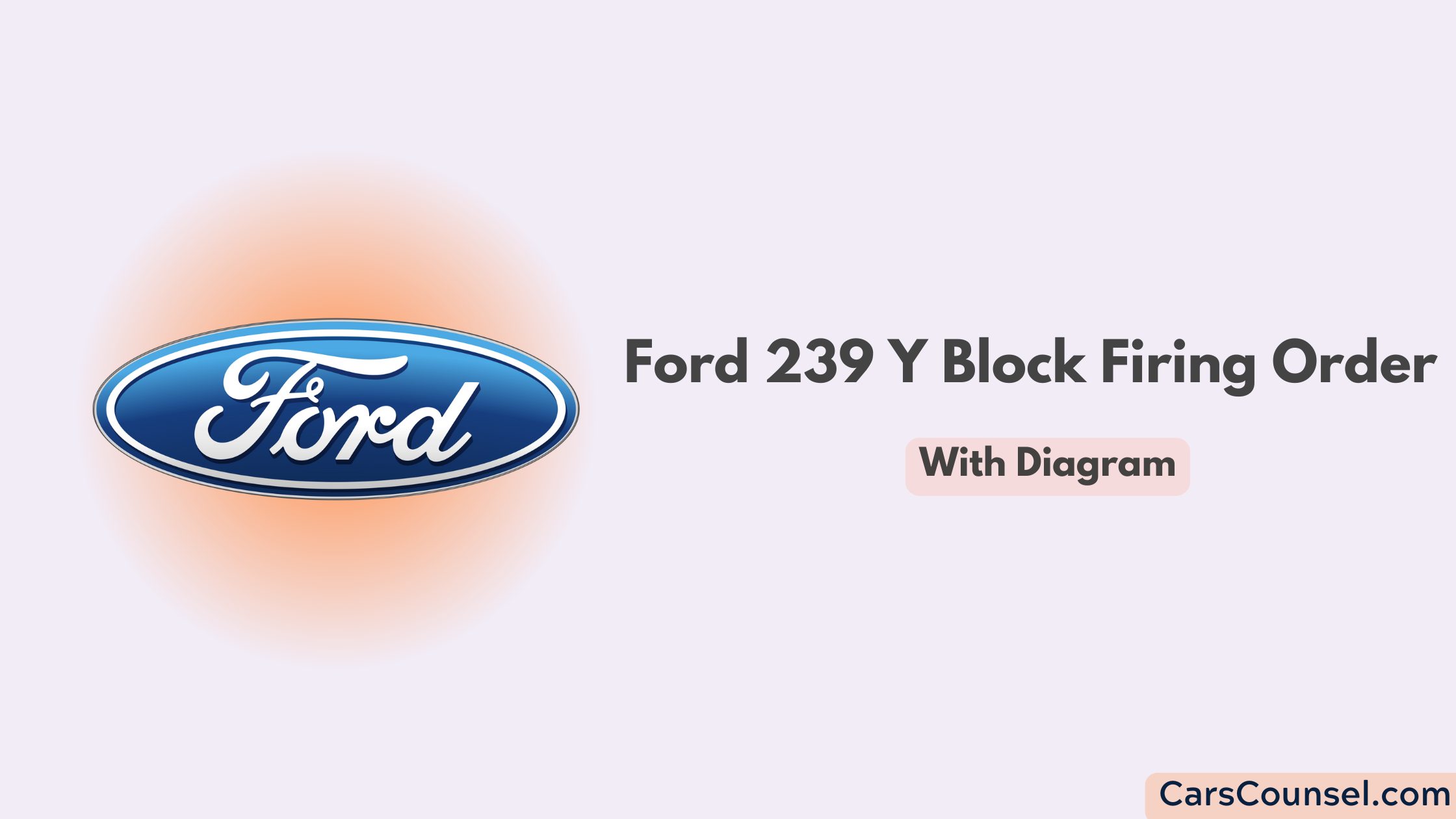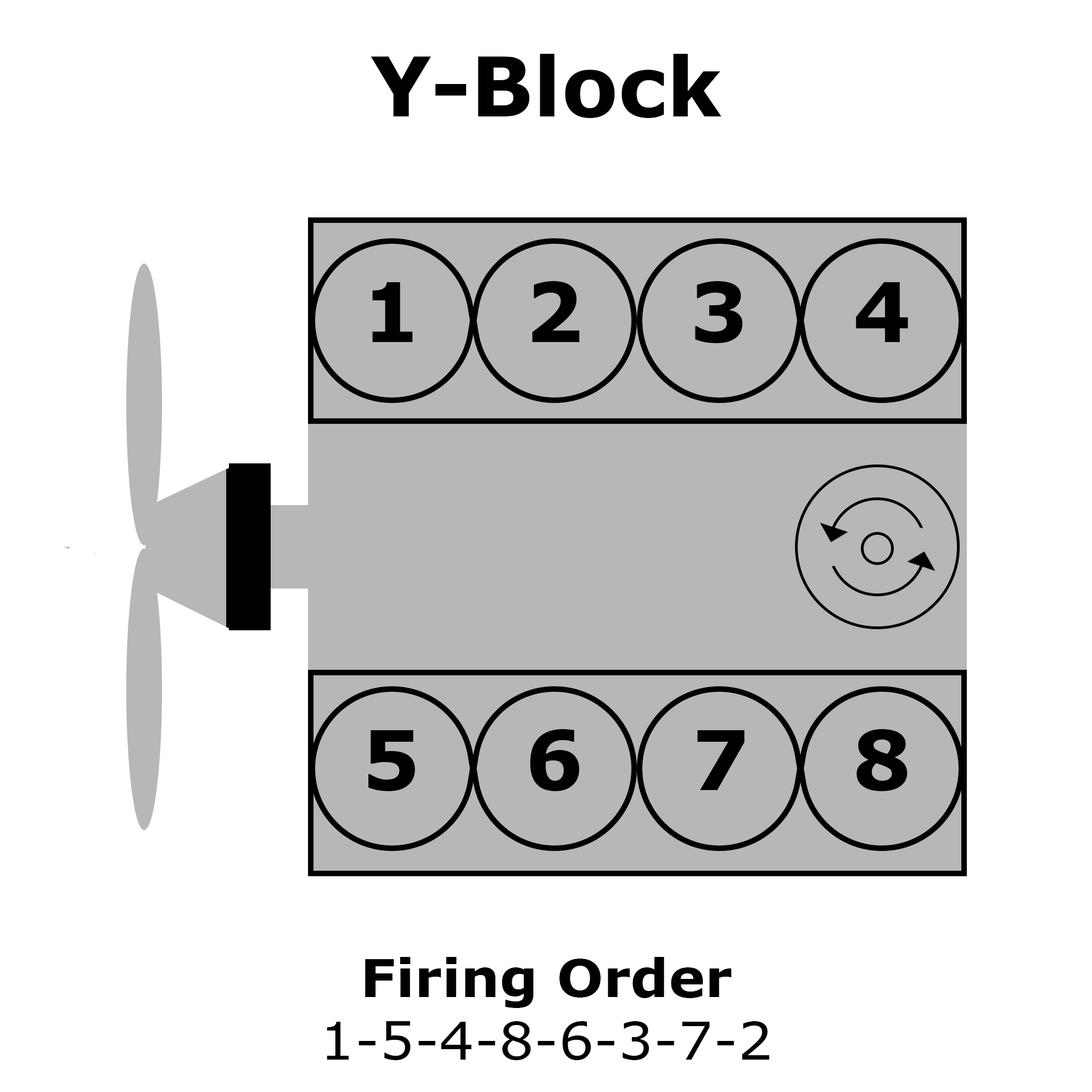The Ford 239 Y-Block engine, introduced in 1954, marked a pivotal moment in automotive history as Ford’s first overhead-valve (OHV) V8 engine. Renowned for its robust performance and durability, the 239 Y-Block powered various Ford vehicles during its era.
Understanding the firing order of this engine is crucial for maintenance, troubleshooting, and ensuring optimal performance. In this detailed guide, we’ll explore the firing order of the Ford 239 Y-Block, its importance, and how to keep it running smoothly.

Quick Navigation
What is the Firing Order of Ford 239 Y-Block?
The firing order for the Ford 239 Y-Block is 1-5-4-8-6-3-7-2, which is a standard configuration for many Ford V8 engines.

The firing order refers to the sequence in which the engine’s cylinders ignite their air-fuel mixture. This sequence dictates how power is generated and distributed, ensuring smooth operation and balanced engine performance.
Why is the Firing Order Important?
The firing order plays a critical role in the engine’s overall performance and functionality. Here’s why it matters:
Balanced Power Delivery
The firing order ensures even power strokes, preventing imbalances that could strain engine components.
Smooth Operation
A well-designed firing sequence reduces vibrations, leading to quieter and smoother engine performance.
Efficient Combustion
The correct sequence ensures that each cylinder ignites at the optimal moment, maximizing fuel efficiency and power output.
Reduced Wear and Tear
The firing order balances forces within the engine and minimizes stress on the crankshaft, bearings, and other components, extending their lifespan.
The Layout of the Ford 239 Y-Block Engine
Understanding the engine layout is essential before diving deeper into the firing order. The Ford 239 Y-Block is a V8 engine, meaning it has eight cylinders arranged in a “V” configuration.
Cylinder Numbering
The cylinders are numbered sequentially, with odd-numbered cylinders on one side and even-numbered cylinders on the other:
- Passenger Side (Right Bank): Cylinders 1, 2, 3, 4 (front to back).
- Driver Side (Left Bank): Cylinders 5, 6, 7, 8 (front to back).
This numbering system is standard for Ford V8 engines and is critical when determining the firing sequence.
The Firing Order Explained: 1-5-4-8-6-3-7-2
The firing order 1-5-4-8-6-3-7-2 indicates the sequence in which each cylinder fires. Here’s how it works in the Ford 239 Y-Block:
- Cylinder 1 Fires First: Located at the front of the passenger side, cylinder 1 starts the ignition sequence.
- Cylinder 5 Fires Next: The ignition moves to cylinder 5, at the front of the driver’s side.
- Cylinder 4 Fires Third: The process returns to the passenger side with cylinder 4.
- Cylinder 8 Fires Fourth: Cylinder 8, located at the rear of the driver’s side, follows.
- Cylinder 6 Fires Fifth: Cylinder 6, also on the driver’s side, continues the pattern.
- Cylinder 3 Fires Sixth: The firing shifts back to the passenger side with cylinder 3.
- Cylinder 7 Fires Seventh: Cylinder 7, on the driver’s side, takes its turn.
- Cylinder 2 Fires Last: Finally, cylinder 2 on the passenger side completes the cycle.
This sequence repeats continuously, ensuring balanced power delivery and smooth operation.
Components That Support the Firing Order
The Ford 239 Y-Block relies on several key components to execute the firing order properly. Each part must function correctly to maintain the engine’s performance:
Crankshaft
The crankshaft converts the pistons’ up-and-down motion into rotational energy, coordinating with the firing order.
Camshaft
The camshaft controls the timing of the intake and exhaust valves, ensuring synchronization with the firing sequence.
Distributor
The distributor directs high-voltage electricity to the spark plugs in the correct firing sequence.
Spark Plugs
Spark plugs ignite the air-fuel mixture in each cylinder, driving the pistons.
Ignition Wires
These wires connect the distributor to the spark plugs, transmitting the electrical current needed for ignition.
Signs of Firing Order Problems
If the firing order is disrupted or incorrect, the Ford 239 Y-Block will show clear symptoms. Recognizing these signs early can prevent more significant issues:
Engine Misfires
When cylinders fire out of sequence, misfires occur, disrupting the engine’s rhythm and reducing power.
Rough Idling
An incorrect firing order often leads to uneven idling, causing vibrations or stalling.
Loss of Power
The engine may struggle to produce power, affecting acceleration and overall performance.
Knocking or Backfiring
Improper ignition timing may cause knocking sounds or backfires, indicating a problem with the firing sequence.
Increased Fuel Consumption
Disruptions force the engine to work harder, burning more fuel and reducing efficiency.
How to Diagnose and Correct Firing Order Issues
If you suspect a problem with the firing order in your Ford 239 Y-Block, follow these steps to diagnose and correct it:
Step 1: Inspect the Distributor Cap
- Check that the distributor cap is properly aligned with the rotor.
- Look for signs of wear, cracks, or corrosion.
Step 2: Verify Spark Plug Wires
- Ensure each spark plug wire is connected to the correct cylinder based on the 1-5-4-8-6-3-7-2 firing order.
- Replace any damaged or misaligned wires.
Step 3: Use a Timing Light
- Attach a timing light to cylinder 1 and observe the timing marks on the crankshaft pulley.
- Adjust the timing if necessary to match factory specifications.
Step 4: Consult the Manual
- Refer to the Ford service manual for diagrams and detailed instructions specific to the 239 Y-Block engine.
Step 5: Test the Engine
- Start the engine and monitor its operation. Look for smooth idling, consistent power, and reduced vibrations.
Maintenance Tips to Preserve the Firing Order
Proper maintenance ensures the firing order remains intact and your engine runs smoothly. Here are some tips:
Replace Spark Plugs Regularly
Worn or fouled spark plugs can disrupt ignition. Replace them at recommended intervals.
Inspect Ignition Wires
Check for cracks, corrosion, or loose connections. Replace damaged wires immediately.
Service the Distributor
Clean and inspect the distributor cap and rotor. Replace them if they show signs of wear.
Verify Engine Timing
Use a timing light periodically to ensure the engine’s timing aligns with the firing order.
Maintain the Fuel System
Keep the carburetor and fuel lines clean to support efficient combustion.
Common Misconceptions About Firing Order
“All V8 Engines Have the Same Firing Order”
While many V8 engines share similar firing orders, variations exist depending on the engine’s design and manufacturer.
“You Can Adjust the Firing Order for Performance”
Altering the firing order without redesigning the engine can cause severe damage and reduce efficiency.
“Firing Order Doesn’t Affect Longevity”
An incorrect firing order increases stress on the engine, leading to premature wear and tear.
Engines with Similar Firing Orders
- 429 Ford Firing Order
- Ford V10 Firing Order
- Ford 460 Firing Order
- Ford 272 Y Block Firing Order
- 2011 Ford Escape Firing Order
Conclusion
The firing order of the Ford 239 Y-Block, 1-5-4-8-6-3-7-2, is a fundamental aspect of its performance and reliability. By maintaining this sequence and ensuring all related components are in good condition, you can keep your engine running smoothly for years to come. Whether you’re restoring a classic car or performing routine maintenance, understanding the firing order empowers you to troubleshoot issues confidently and maintain peak engine performance.
With proper care and attention, your Ford 239 Y-Block can continue to deliver the power and dependability that made it a standout engine in its time.

